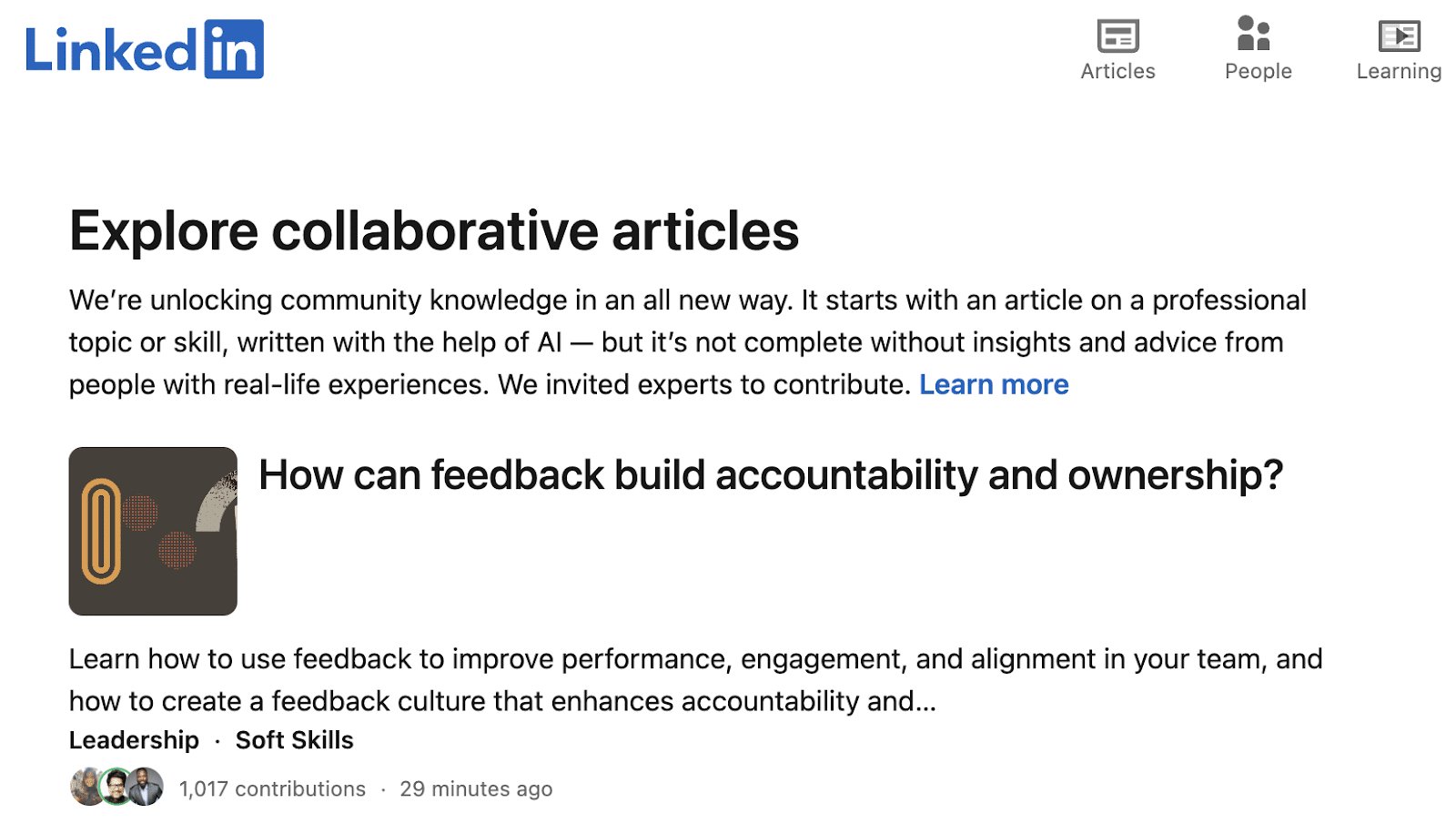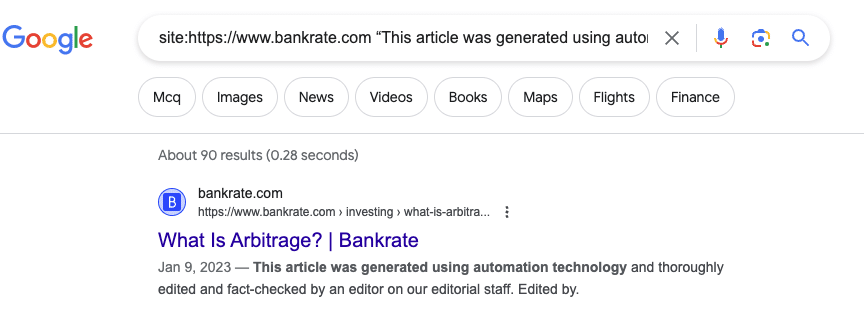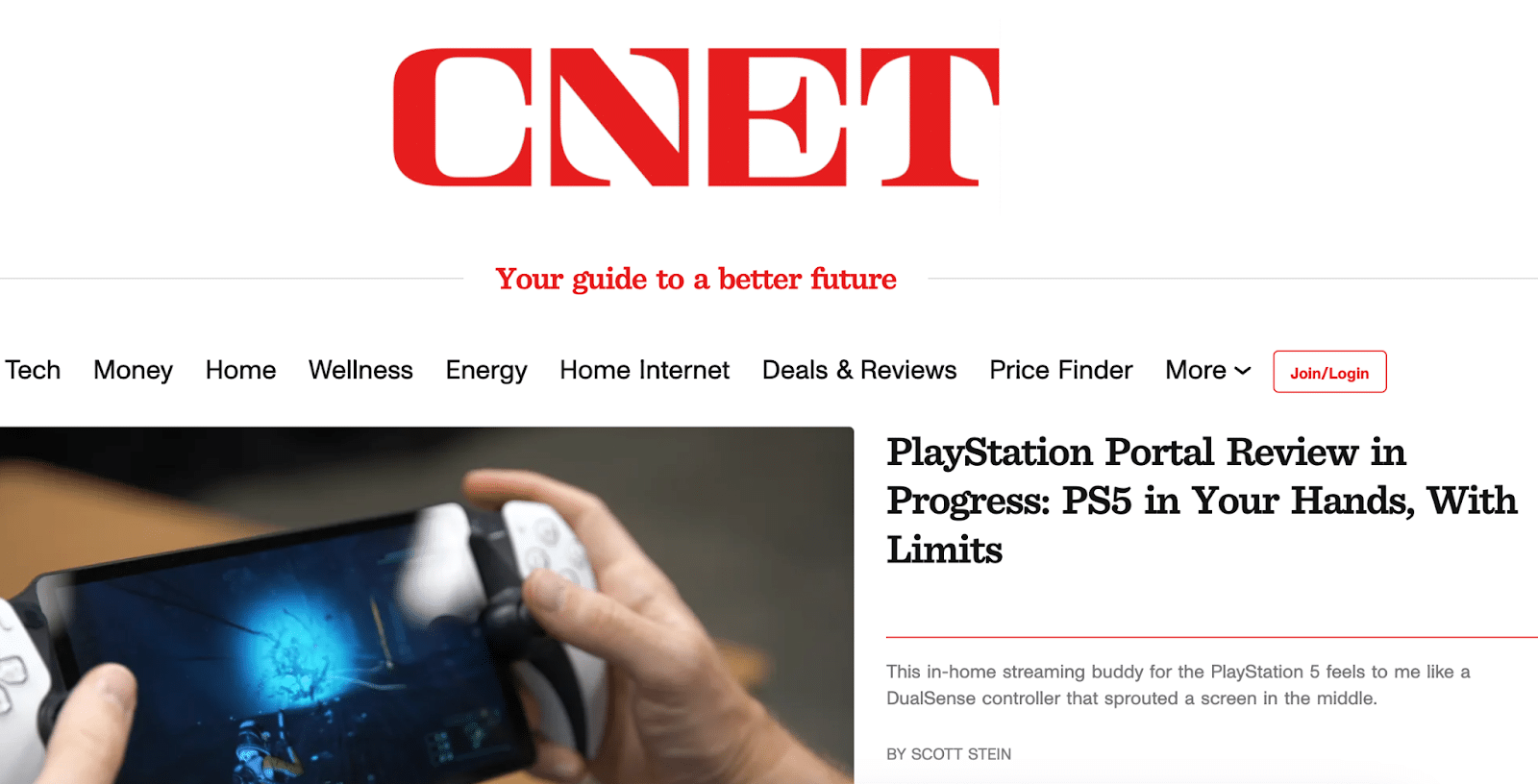Are you looking for some examples of how companies are using AI for SEO successfully? You are in the right place.
Maybe you are playing with the idea of using AI for tangential SEO. Maybe you are already an SEO pro looking to improve your content generation efficiency. Or you simply want to learn more about the state of AI for SEO.
Whichever is the case, these companies using AI for SEO will provide you with the inspiration you need.
1. LinkedIn collaborative articles

- Monthly visits: 1.5 million
- Model: AI writing plus human contribution
- Estimated AI-written articles: 141,855 (U.S. only)
LinkedIn is the most popular social networking site for people who want to build relationships, learn and figure out a way to do business online.
LinkedIn collaborative articles program was launched early this year, and it reached over 1.5 million organic users. The articles are AI-powered to start a conversation about various topics, then enhanced with expert perspectives and contributions from the LinkedIn community.
But with much AI-powered content, why are collaborative articles so successful?
First of all, LinkedIn’s authority in the space is second to none. They have been around for a long time, and the website generates over 700+ million monthly visits from search engines. This is not simply a site that does some traditional SEO.
Instead, they test new strategies and tactics to find the best one that works for them. They also launched LinkedIn Pulse many years ago, similar to a news and blogging platform for the community.
Secondly, LinkedIn collaborative articles work by invitation only, which means you need to be an expert in your field to contribute to a piece of content and receive an invitation. For LinkedIn, exclusive access to this talent pool is a goldmine, and this is exactly what Google E-E-A-T is looking for in your content.
In exchange for their expert advice, contributors will receive a “Top Voice” badge once they add a certain number of highly specialized contributions to the AI-written piece.
The exact number of contributions needed to get the badge is not clear yet. Some experts recommend writing 10-15 contributions to become eligible. Look at the collaborative articles home page to find what you can contribute.
However, starting in September, after reaching a peak of 2.7 million visits, the program started losing significant organic visitors, with many pages losing indexing on Google and other search engines.
This is a consequence of Google algorithms assessing their AI-written content as not good and not helpful enough, despite the human contributions to them.

2. Bankrate

- Monthly visits: 20 million
- Model: AI-written content with human editing and fact-checking.
- Estimated AI-written articles: 213
Bankrate is a huge affiliate website that focuses on providing personal finance advice on products and services from credit cards to savings, home buying and personal loans. It’s been running since 1976, and although it’s not the most modern affiliate marketing website, I love its simplicity.
Bankrate is doing what most blogging and affiliate marketing sites do when it comes to generating many articles – they let AI generate an article and then get an editor to fact-check and review it.
The difference is that Bankrate operates in the sensitive niche of the YMYL industry (Your Money, Your Life), which includes personal finance. And Google has stricter guidelines about YMYL topics.
Google says:
“For pages about clear YMYL topics, we have very high Page Quality rating standards because low-quality pages on such topics could potentially negatively impact a person’s health, financial stability, or safety, or the welfare or well-being of society.”
Because Bankrate articles fall into the YMYL niche, Google is especially strict, and if they don’t like AI-written content, they definitely won’t reward Bankrate’s article.
Dig deeper: Google search responds to BankRate, more brands using AI to write content
I love that Bankrate published 213 AI articles and that they are very open about using AI for content. They have a disclaimer at the bottom of every piece:
- “This article was generated using automation technology and thoroughly edited and fact-checked by an editor on our editorial staff.”
Take this article about “What is a prepaid card” for example, if it wasn’t for the disclaimer, I wouldn’t be able to tell if AI or a human wrote it.
However, in the last few months, Bankrate started to display the disclaimer less often, meaning that they stopped using AI-written content for many articles.
From 213 articles at the beginning of the year, they went down to just 90 at the time of writing.
I checked this by adding the search parameter:
- site:https://ift.tt/XUroZu6 “This article was generated using automation technology”

It’s not unusual to see companies stopping the use of AI-written articles. I found other companies doing the same thing and dropping AI altogether. There are a few reasons for doing this: either AI didn’t save Bankrate enough time, or AI content is not doing so well on search engines.
Although we can’t be sure of the reason, Bankrate was one of the first companies to experiment with AI-generated articles and much of their content ranked on top of search engines for many months during 2023. So, we can safely say that AI content can rank if it’s considered helpful, correct and fact-checked.
This brings us to the next company using bot-generated content but without enjoying the previous companies’ success: CNET.
Dig deeper: Why using AI to create YMYL experts is a REALLY bad idea
3. CNET

- Monthly visits: 25 million
- Model: AI-assisted content
- Estimated AI-written articles: 70
CNET is probably the most visited tech review website in the U.S. The site has built its reputation as a trustworthy media outlet by reviewing products and publishing opinions and news on tech.
“If you can snap a picture with it, watch it, type on it or subscribe to it, chances are we've reviewed it.” This is what they pride themselves on.
So, what is the deal with CNET and AI-generated content? Earlier this year, in January, CNET made news worldwide for being the first site to publicly admit using ChatGPT for writing content. Just like Bankrate, they used the same type of disclaimer at the bottom of their articles.
The difference between Bankrate and CNET is that CNET’s disclaimers receive a lot of criticism because CNET is turning its back on journalistic research and expert opinions in exchange for cheap writing.
This move doesn’t only raise ethical concerns related to the loss of writing jobs. Still, it also tries to manipulate organic rankings – especially when articles are carefully structured to rank high on search engines.
As we know, this goes against Google’s guidelines, so CNET future of the program with AI will make or break according to Google’s algorithm. It’s a risky move for the company, which seemed to backfire.
In February 2023, CNET received even more criticism because factually incorrect sentences started to emerge.
The initial reports about the stories had inaccuracies, including mix-ups between APR and APY and an incorrect calculation suggesting a savings account with $10,000 at a 3% interest rate would gain $10,300 when, in fact, it would earn $300.
As a result, CNET drastically reduced the amount of content written by AI as they realized the opportunity to artificially manipulate rankings and gain an SEO advantage against ruining their reputation probably wasn’t worth the effort.
Dig deeper: Google warns against content pruning as CNET deletes thousands of pages
4. TV 2 Fyn

- Monthly visits: 300,000
- Model: ChatGPT
- Estimated AI-written articles: 46
If you are looking for SEO A/B testing of AI-generated content, RD @ TV 2 Fin is your case study. Over three weeks in December 2022 and January 2023, the team conducted A/B testing with ChatGPT-generated headlines.
These tests involved feeding the AI both full articles and article summaries, then refining the suggested headlines based on specific criteria, like including certain words or names.
The effectiveness of these AI-generated headlines was then compared with the original human-created headlines and evaluated using data from Chartbeat, a platform that tracks web analytics.
In the experiment, each test included one original headline and two created in collaboration with ChatGPT. Out of 46 A/B tests conducted, the AI-generated headline won in 21 instances, the original won in 11, and 14 cases, there was no clear winner due to low click-through rates.
When focusing on tests with a definitive winner, the AI had a 65-35 advantage. However, adjusting for the fact that there were two AI headlines against one original in each test, the distribution slightly favored human editors over AI.

So, what exactly can we learn from these experiments?
- AI efficiency: AI can significantly streamline the headline creation process, saving time and resources.
- Effectiveness in engagement: The use of AI-generated headlines led to a notable increase in click-through rates (59% overall), indicating that AI can effectively engage readers.
- Human-AI collaboration: The best results were often achieved when human editors refined AI-generated headlines, suggesting a potential between AI and human creativity.
- Learning curve and limitations: While AI was generally responsive to specific instructions, there were instances where it struggled to develop headlines, highlighting the technology's current limitations further.
5. The Verge’s satirical AI post ranking for a competitive keyword

- Monthly visits: 8 million
- Model: ChatGPT without human check
The experiment involving The Verge's AI-written blog post, "Best printer 2023: just buy this Brother laser printer everyone has, it’s fine," illustrates the complex relationship between content quality and search engine optimization.
Although AI-generated and not intended as serious content, the article still ranks well in Google search results. They admittedly didn’t even check any facts or proofread the content.

They simply copy-pasted the copy provided by ChatGPT. The 275-word article written in five minutes ranks on Google for an extremely competitive keyword, “best printer 2023.”

This high ranking can be attributed more to The Verge's strong authority than the capabilities of AI like ChatGPT.
While a website's overall authority significantly influences search rankings, Google's focus on content quality and user search intent means such AI-generated content might only achieve temporary real estate in search results.
I said “it might” because this article was written in March 2023, and back then, everyone believed it wouldn’t last a month on search results.
However, we are in November, and the article still ranks above Forbes, The New York Magazine, Trusted Reviews and many more.
So, what factors impact the success of AI-driven content?
The use of AI in content creation, particularly for SEO, is a rapidly evolving field with diverse outcomes. Several key factors influence the success of AI-written content:
Platform authority and trust
- Platforms like LinkedIn benefit from established authority and a wide user base, enhancing the performance of their AI-generated content.
Human-AI collaboration
- The most successful use of AI in content creation involves a blend of AI efficiency and human expertise. This is evident in LinkedIn’s collaborative articles and Bankrate’s fact-checked AI articles.
Content accuracy and quality
- For sensitive topics, particularly in the YMYL (Your Money, Your Life) sector, the accuracy and quality of content are paramount. AI content must be fact-checked and aligned with ethical guidelines to avoid misinformation.
Google's evolving algorithms
- Google’s algorithms are increasingly sophisticated in evaluating content quality. AI-written content must meet high standards of helpfulness and accuracy to perform well in search rankings.
Ethical and professional considerations
- The use of AI in journalism and content creation raises ethical questions, as seen with CNET's backlash. Maintaining journalistic integrity and ethical standards is crucial.
SEO strategy and execution
- The success of AI content in SEO is not just about the content itself but also about how it is integrated into a broader SEO strategy. This includes understanding the nuances of algorithmic changes and user search intent.
Authority
- The case of The Verge highlights that strong authority can influence the search rankings of AI-generated content. However, this is not a standalone factor and must be balanced with content quality and relevance.
Finding success in your AI-assisted content efforts
The use of AI for SEO content creation is still in its early stages, with mixed results across different companies. While AI tools can improve efficiency, the highest performance seems to come from combining AI with human expertise.
As Google's algorithms evolve, content accuracy, quality and alignment with user intent will likely grow as determining factors.
Brands must balance ethics and SEO strategy when leveraging AI writing. With the right approach, AI can become an asset for content creation, but human oversight remains critical.
Dig deeper: 17 tips to improve your AI-assisted content creation process
The post AI for SEO content creation: 5 real-world examples appeared first on Search Engine Land.
via Search Engine Land https://ift.tt/m6VfNdP

No comments:
Post a Comment